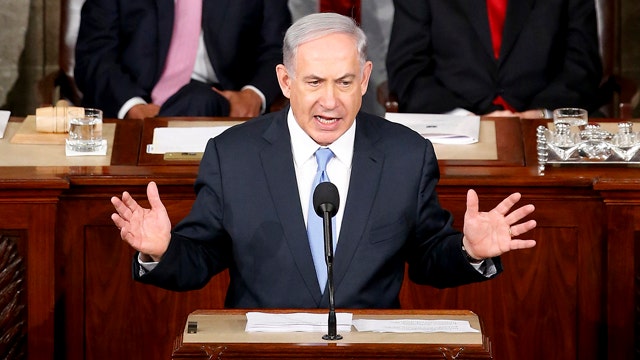Netanyahu: Iran's regime is 'not merely a Jewish problem'
Part 1 of Israeli prime minister's address to joint meeting of Congress
Israeli Prime Minister Benjamin Netanyahu used a controversial speech before the U.S. Congress to appeal to President Obama to pull back on nuclear talks with Iran, warning the "bad deal" in the works "paves Iran's path to the bomb" and could lead to a "potential nuclear nightmare."
The Israeli leader made his impassioned case Tuesday in a highly anticipated address in Washington. He claimed the potential deal would make two major concessions which would threaten the security of Israel and the region by retaining Iran's ability to start up a nuclear weapons program.
"This is a bad deal. It's a very bad deal. We're better off without it," Netanyahu said.
The Israeli leader spoke as part of a high-profile push to make his case against the pending deal. He said the agreement in the works makes two major concessions. First, it would leave in place a "vast nuclear infrastructure," since it wouldn't require nuclear facilities to be destroyed -- some centrifuges would be allowed to keep running, while others would merely be disconnected, he said.
Second, Netanyahu said the restrictions would "automatically expire" in about a decade.
"It's the blink of an eye in the life of a nation," Netanyahu said.
The deal, he said, "doesn't block Iran's path to the bomb. It paves Iran's path to the bomb." He reminded the audience of Iran's deep history of funding terror and threatening Israel.
Countering the argument that the alternative to this deal is war, Netanyahu argued that the alternative is actually a "much better deal" -- and suggested the U.S. has the leverage to achieve that.
The address was the centerpiece of a controversial visit that has fueled diplomatic tensions between the Obama and Netanyahu administrations -- and political tensions on Capitol Hill.
House Speaker John Boehner had invited the Israeli leader without involving Obama, which is considered a breach in protocol. Republican leaders defended the move, saying it's important for Netanyahu to explain the threats posed by Iran and his concerns with the current nuclear talks.
But dozens of Democrats sat out the Israeli leader's speech. And Obama National Security Adviser Susan Rice went so far in recent days as to call Netanyahu's speech "destructive" to U.S.-Israeli ties -- though administration officials have since toned down their characterization of his visit.
In his opening remarks, Netanyahu said he regrets some have perceived his visit as political. "That was never my intention," he said.
Despite the controversy, he received a standing ovation from lawmakers on both sides of the aisle, and was interrupted roughly 40 times by applause.
Meanwhile, he urged the U.S. not to "be fooled" by Iran's recent efforts to oppose the Islamic State in Iraq and Syria, a group the U.S. also is fighting. Netanyahu said those groups are "competing for the crown of militant Islam."
"When it comes to Iran and ISIS, the enemy of your enemy -- is your enemy," he said.
He also blasted the terms of the potential nuclear deal. He said Iran is notorious for playing a game of "hide and cheat" with inspectors.
Both the Obama and Netanyahu administrations, as a matter of policy, agree that Iran must not be able to obtain a nuclear weapon. But the Israeli leader has concerns that the framework of the current diplomatic talks could lead to an ineffective deal.
Obama, speaking in an interview Monday night with Reuters on the eve of Netanyahu's speech to Congress, acknowledged the shared goal, then added Netanyahu "thinks that the best way to do that is either through doubling down on more sanctions or through military action, ensuring that Iran has absolutely no enrichment capabilities whatsoever."
He added, "there's no good reason for us not to let the negotiations play themselves out."
Obama has no plans to meet with the prime minister -- though the White House insists this is out of a desire not to appear to be influencing upcoming Israeli elections.
Netanyahu considers unacceptable any deal that does not entirely end Iran's nuclear program. But Obama is willing to leave some nuclear activity intact, backed by safeguards that Iran is not trying to develop a weapon. Iran insists its program is solely for peaceful energy and medical research.
The address comes as Congress also weighs legislation that would trigger more sanctions against Iran if a diplomatic deal fails. Obama opposes that bill.
The Associated Press contributed to this report.













































